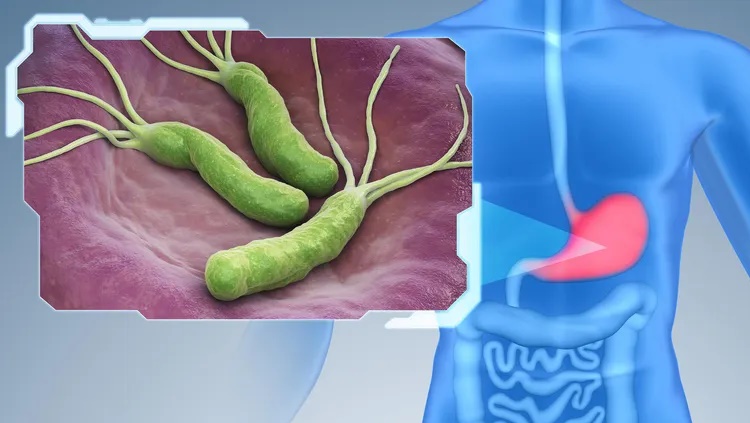Helicobacter pylori: This is what makes the stomach germ so dangerous
Researchers have found that the bacterium Helicobacter pylori alters the gastric glands, overriding a mechanism that protects against cancer.

Infection of the gastric mucosa with the bacterium Helicobacter pylori is one of the most common bacterial infections worldwide. About every second person is affected. If the germs settle permanently in the gastric mucosa, they can trigger chronic inflammation there.
There is also a risk of ulcers forming in the stomach or duodenum. Bleeding can occur, and in severe cases it can lead to a perforation of the stomach or intestines.
But a Helicobacter infection harbors another danger: anyone who has contracted the germ has a roughly two to three times higher risk of developing stomach cancer. Some experts assume an even higher risk. Researchers have investigated which mechanisms play a role here and published their results in the journal “Nature Communications”.
Increased risk of cancer from gastric infection: what is behind it?
Scientists at the Berlin Charité and at the Max Delbrück Center for Molecular Medicine of the Helmholtz Association have observed conspicuous changes in the gastric glands that occur in the course of an infection with the bacterium Helicobacter pylori and can promote the formation of cancer.
The researchers discovered a previously unknown mechanism that limits cell division in healthy tissue and thus protects against cancer. In the case of an infection with Helicobacter bacteria, however, this is reversed. As a result, cells grow uncontrollably and can degenerate more easily and develop gastric carcinoma.
“Previously, it was assumed that a Helicobacter infection directly damages the glandular cells of the gastric mucosa,” says study author Dr. Michael Sigal from the medical clinic with a focus on hepatology and gastroenterology at the Charité.
“Our team has now found that the complex interactions of different cells and signals that ensure tissue stability are disrupted by infection.”
Messenger substances influence tissue structure / Helicobacter pylori
So-called stromal cells, which perform a general support and nutritional function in organs and also surround the stomach cells, play an important role in this process. They not only ensure mechanical stability, but also produce messenger substances that significantly influence the behavior of the glands. These messenger substances also include the “bone morphogenetic protein” (BMP), which is important for tissue development.
The researchers were able to show that stromal cells continuously suppress the BMP signaling pathway and thus stimulate the division of the stem cells located there. In contrast, stromal cells at the gland tip activate the signaling pathway and thus prevent cell division.
Dangerous cell growth
In the case of a Helicobacter infection, the mutual processes are disturbed and inflammatory substances are released. In the course of this inflammatory reaction, messenger substances are increasingly produced that stimulate and accelerate the cell division of the stem cells in the glands.
Eventually, cell growth causes the tissue to enlarge. This can lead to precancerous lesions, which can then develop into gastric carcinoma. Chronic inflammation of the gastric mucosa by the bacterium Helicobacter pylori is therefore considered a major risk factor for gastric cancer.
Helicobacter easily treatable with antibiotics
But there is also good news: In most cases, gastric mucosal inflammation can be treated very well. As a rule, the infection can be completely eliminated with antibiotics. It is all the more important that the medical diagnosis is made early and drug therapy is started in good time.
However, Helicobacter bacteria are becoming increasingly resistant to antibiotics. A few weeks after the end of treatment, the doctor should therefore check whether the treatment was successful.
These symptoms can indicate the stomach germ / Helicobacter pylori
Infection with Helicobacter pylori can go silently without any noticeable symptoms, so that in some people it often goes unnoticed for a long time and yet becomes chronic.
In many patients, however, a Helicobacter infection becomes noticeable through various symptoms:
bloating
pain in the upper abdomen
stomach pressure
nausea and vomiting
belching and heartburn
loss of appetite
Bad breath that comes from the stomach.
The guideline for gastric carcinoma focuses on risk groups in particular: These are primarily patients with permanently inflamed or altered gastric mucosa. Or people who have first-degree relatives such as parents, siblings or children with stomach cancer. They should be tested for Helicobacter and treated with antibiotics if positive. This significantly reduces the risk of gastric cancer….


